Learn C & C++ Languages
Boost your programming career with C & C++ from CMIT Institute
Learn Offline / Online / Hybrid
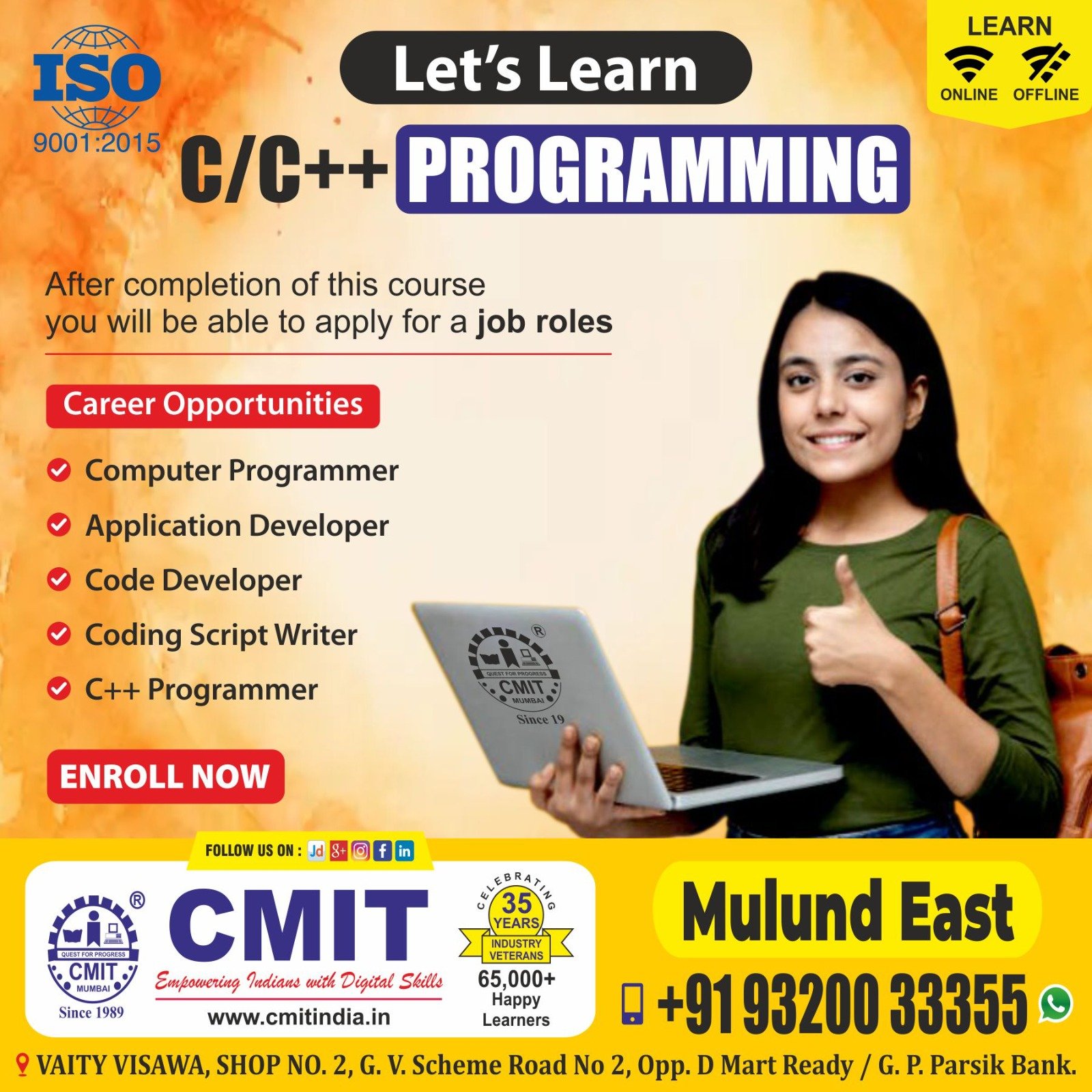
“CMIT Institute’s C and C++ Certification covers procedural and object‑oriented programming, data structures, algorithms, memory and performance optimization, and real-world projects to prepare learners for systems and embedded development.”
Quick Enquiry
Gallery
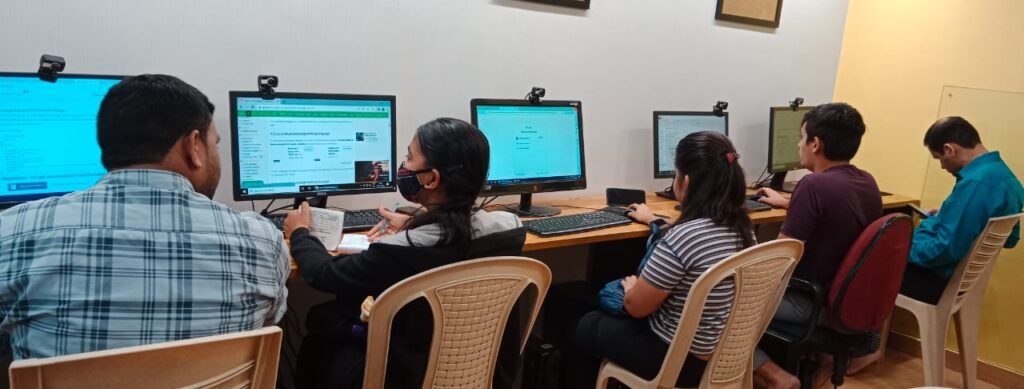

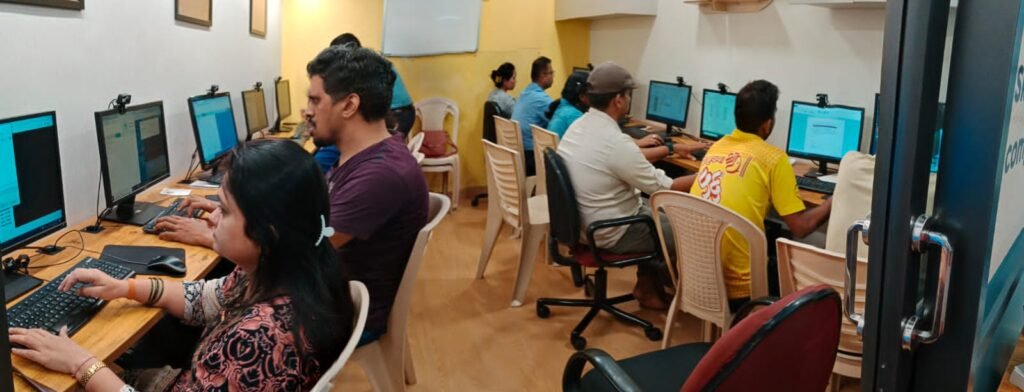
Student Reviews
Trustindex verifies that the original source of the review is Google. I've recently completed diploma course in CMIT computer institute , , mulund east and it was really helpful. The course taught me a lot skills in computer. The mentors here are very helpful and understandable.There teaching skills are very goodTrustindex verifies that the original source of the review is Google. As being a cmit student all the faculty has helped me to experience a good journey towards the Microsoft World and Tally prime which has enhanced my technical journey.Trustindex verifies that the original source of the review is Google. The faculty is very great and supportive the teachers are so good in teaching and plus the doubts are always cleared thoroughlyTrustindex verifies that the original source of the review is Google. A very good experience overall. The faculties try their best to make us understand the concept.Trustindex verifies that the original source of the review is Google. The institute is good all teaching staff in nice they teach us till we don't understand the concept of the topic Thank you!!Trustindex verifies that the original source of the review is Google. Overall experience was good, the Excel teacher teaching style was good, But I would have loved if it was only one group teaching for full 1 hour. But overall good value addition and good value for money. ThankyouTrustindex verifies that the original source of the review is Google. I recently completed the Advanced Excel course in CMIT Computer Institute, Mulund East, and it was really helpful! The course taught me a lot of new Excel skills that I can now use for work or personal projects.Trustindex verifies that the original source of the review is Google. It was an amazing experience here learning at CMIT , all my doubts were cleared and explained throughly !Trustindex verifies that the original source of the review is Google. Very good
- High performance: compiled to fast native code, so programs run efficiently.
- Low-level access: pointers and direct memory control teach how hardware and memory work.
- – Portability: ANSI C compilers exist for almost every platform, making code widely usable.
- – Strong foundation: concepts and syntax underpin many languages (C++, Java, Rust), easing further learning.
- – Systems and embedded use: dominant in OS, compilers, firmware, and embedded systems—valuable for jobs and real-world projects.
-
- C++ is a highly portable language and is often the language of choice for multi-device, multi-platform app development.
- C++ is an object-oriented programming language and includes classes, inheritance, polymorphism, data abstraction and encapsulation.
- C++ has a rich function library.
- C++ allows exception handling, and function overloading which are not possible in C.
- C++ is a powerful, efficient and fast language. It finds a wide range of applications – from GUI applications to 3D graphics for games to real-time mathematical simulations.
Why Learn C & C++
C++ has the Standard Template Library(STL) which is very useful as it helps in writing code compactly and quickly as required. It contains mainly four components i.e. algorithms, containers, functions, and iterators.
All the major operating systems such as Windows, Linux, Android, Ubuntu, iOS, etc. are written in a combination of C and C++.
It is very useful as it helps in writing code compactly and quickly as required. It contains mainly four components i.e. algorithms, containers, functions, and iterators. The algorithms are of different types such as sorting, searching, etc.
There are many modern-day databases such as MySQL, MongoDB, MemSQL, etc. that are written in C++. This is because C++ is quite modern and it supports features like exceptions, lambda expressions, etc.
C++ is closer to the hardware level and is a comparatively low-level language. Because of this reason, it is used in many compilers as a backend programming language.
C++ Programming Topics
- Basics in C++
- Control Structures
- Functions
- OOPs Concept
- Class Objects
- Constructor Destructor
- Programming methods
- OOP Concept
- Intro To C++
- Structure of C++
- Scope Resolution Operator, Data type, variable, Operator etc
- Conditional Statements
- Loops
- Jump Statement(goto, break, continue)
- Intro to Function
- Defining Function
- Prototype
- Actual and Formal Argument
- Parameter Passing Technique
- Inline function
- Intro to Function
- Defining Function
- Pr
- Class and Objects
- Encapsulation
- Polymorphism
- Static, Dynamic binding
- Inheritance
- Abstraction
- ototype
- Actual and Formal Argument
- Parameter Passing Technique
- Inline function
- Class Declaration
- Access member and Member functions
- Creating Objects
- Static Members
- Freind function and classes,this pointer
- Defining Constructor
- Default Constructor
- Argument Constructor
- Copy Constructor
- Constructor Overloading
- Destructor
- Constructor Destructor
- Operator Overloading
- Inheritance,Abstraction, Interface
- Polymorphism Virtual functions
- Templates
- Defining Constructor
- Default Constructor
- Argument Constructor
- Copy Constructor
- Constructor Overloading
- Destructor
- Need Of Overloading
- Defining Overloaded function
- Overloading Other operators
- Introduction
- Types Of Inheritance
- Single, multiple, multilevel, hybrid, hierarchical inheritance
- Inheritance Scope
- Data Abstraction, Interface
- Type of Polymorphism
- Dynamic binding
- Function overriding
- Virtual function
- Pure virtual function
- Need of template
- Defining template
- Function template
- class template
- Exception Handling
- Streams
- File Handling
- Dynamic Memory
- References
- What is exception
- Types of exception
- Exception handling mechanism
- Heirarchy of Stream
- Istream,ostream functions
- Heirarchy of file stream
- opening file
- file opening modes
- Reading of file
- Writring of file
- file functions
- Dynamic memory allocation for arrays
- Dynamic memory allocation for objects
- References
- Date time
- Numbers in c++
- Array,pointer,structure
- Storage classes
Who Should Learn C++ ?
M Com, MBA IT & others
FAQ"S
Average salary for a C Developer in India is 4.8 Lakhs per year (₹39.6k per month). Salary estimates are based on 439 latest salaries received from various C Developers across industries.
- Wipro C Developer Salary – ₹4.9 Lakhs per year
- TCS C Developer Salary – ₹4.0 Lakhs per year
Average starting Salary for C Developer in India is around ₹1.8 Lakhs per year (₹15.0k per month). No prior experience is required to be a C Developer.
Highest salary that a C Developer can earn is ₹13.5 Lakhs per year (₹1.1L per month).
An Entry Level C Developer with less than three years of experience earns an average salary of ₹5.2 Lakhs per year. A mid-career C Developer with 4-9 years of experience earns an average salary of ₹14.0 Lakhs per year, while an experienced C Developer with 10-20 years of experience earns an average salary of ₹24.5 Lakhs per year.
Affiliations / Authorizations
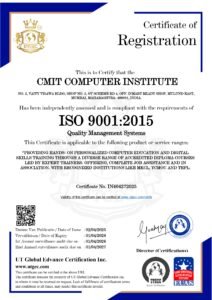
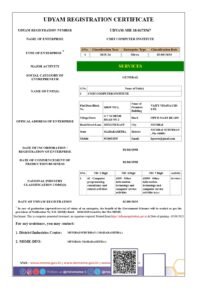
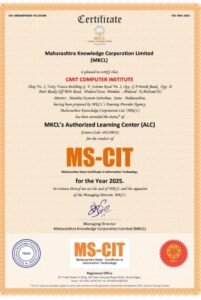
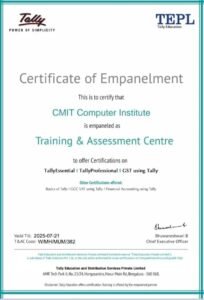
Why Choose CMIT ?

Certified and Experienced Trainers

Weekdays / Weekend Batches Available

Affordable Fees

Small Batch Sizes
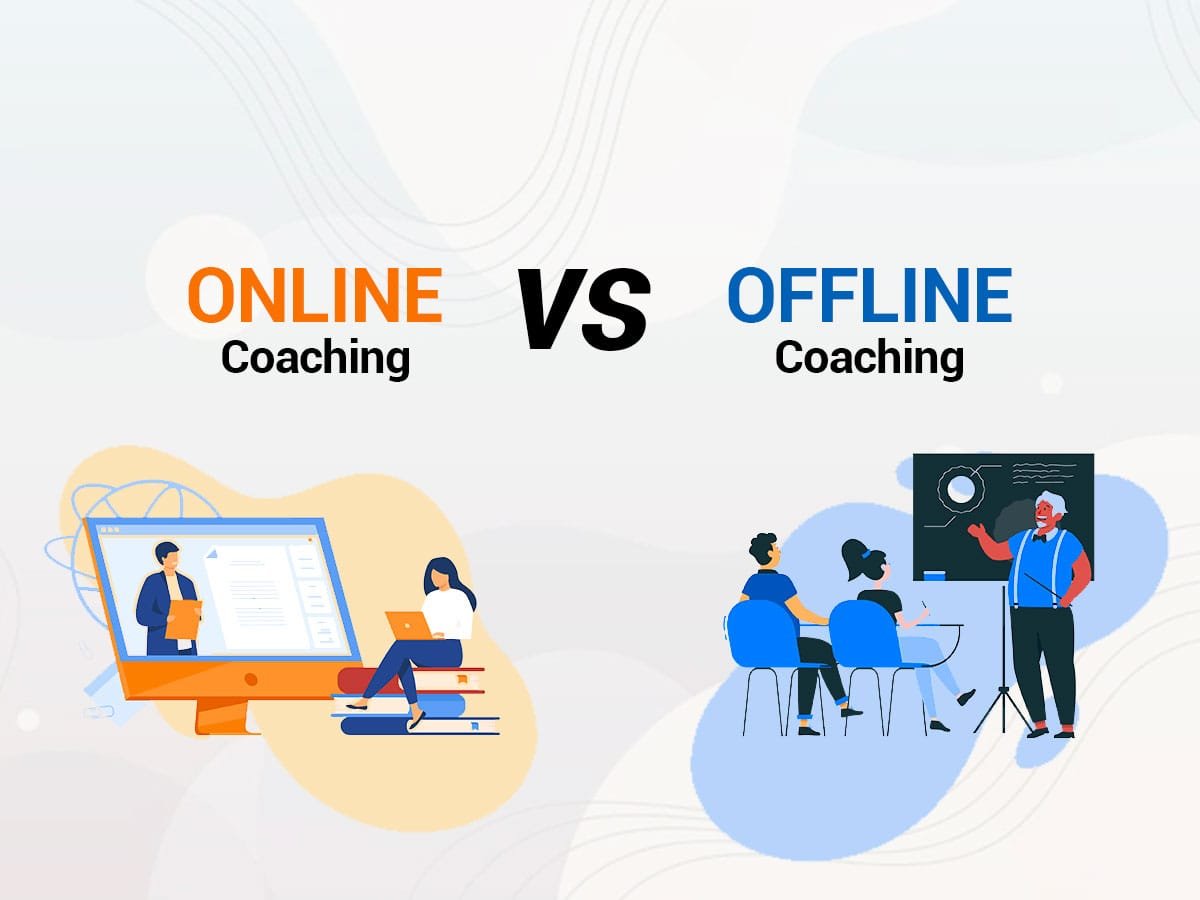
Flexible Learning Options

Individual Attention

Free Wi-Fi Facility

Periodical Assessment

Course Completion Certificate

100% Job Assistance


